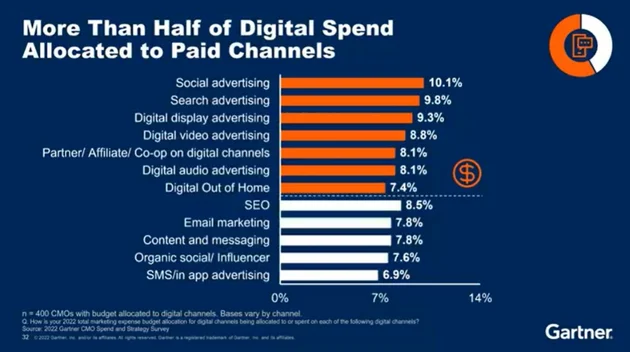In the fast-paced world of business, planning your marketing budget is not just a routine task—it’s a critical step in ensuring your company’s growth, scalability, and prosperity.
Many business owners cringe at the idea of reviewing their budgets because the most common goal is to save money. Checking budget numbers can be time-consuming and, let’s be honest, a little boring. But, these reviews are a necessary evil, so your business grows as you dreamed it could each year.
Let’s dive into the details of creating an effective marketing budget for 2024.
Understanding Your Business Budget
At its core, a business budget is a comprehensive blueprint outlining your financial allocation on a monthly, quarterly, or, most commonly, an annual basis.
It’s about assigning each dollar a specific “job” based on what you believe will maximize your business’s potential. Once you’ve crafted your initial budget, it’s essential to periodically compare it to your actual expenses to gauge your financial performance.
Avoid the Temptation to Cut Key Areas
When it comes to reviewing budgets, many business owners initially focus on cutting costs.
However, this often leads to reallocating funds from areas like advertising and marketing, business development, networking, events, or recruitment. Surprisingly, these are precisely the areas with the most potential to drive growth and attract new customers.
Allocating Your Marketing Budget
To allocate your marketing budget effectively, consider industry standards.
There’s no hard and fast answer to how much your marketing budget should be, but many businesses use a percentage of revenues as their guide.
According to the U.S. Small Business Administration, the average business spends a little more than one percent of revenue on advertising. This varies from industry to industry. For instance, a retailer may spend more than four percent, while a restaurant might pay almost two percent.
Web Strategies reports that a Marketing Charts Survey done in 2022 showed inflation was a primary driver of marketing budget changes, as well as the continuing impact of the COVID pandemic and economic recession.
The study also found that 42 percent of companies are increasing their marketing budget, while 32 percent are actually decreasing theirs.
Marketing budget as a percent of total revenue can vary significantly from one industry to another.
While B2C product companies spend an average of 15 percent of revenue on marketing, B2B product companies are spending a lot less at more than seven percent of revenue.
Embracing Digital Marketing
Over the past decade, digital marketing has seen significant growth, especially during the pandemic.
Many companies are dedicating more than half of their digital marketing spend to paid channels like social media, search, display, and video advertising.

Tracking your marketing results is the fundamental way to get the best return on investment (ROI). Following those results can be as easy as asking new customers where they learned about your business or using different print, direct mail, TV, or radio advertising codes to learn which medium attracted the most customers.
We could talk until we’re blue in the face about budgets and numbers, but what we think is more helpful is to focus attention not only on your advertising and marketing line items but also on your digital and social media marketing and how they relate to your overall business goals for ROI.
Navigating Your Digital & Social Budget
Let’s explore some tips specifically tailored to your digital and social media marketing budget for 2024:
1. Regularly Review Your Budget with Your Team
Frequent reviews (preferably quarterly) of your overall business and marketing budget with your leadership team are essential.
This prevents overspending or underspending in departments and helps track project successes and spending efficacy.
2. Designate Budget Review Champions
Assign a dedicated professional in each department or the entire company for smaller teams to regularly review budgets and remind the team of goals and ROI expectations.
Data-driven decisions are the key to budget success.
3. Be Ready to Share
When reviewing the previous year when planning for the upcoming one, be ready to share analytics and data supporting the request for additional funds or reallocation.
The proof is in the pudding.
4. Separate Advertising Categories
Ensure your marketing budget differentiates between traditional and digital ad buys.
The digital landscape offers more visibility, so allocate a significant portion to digital advertising. Depending on your industry, a 60-40 split or greater is often appropriate.
5. Break Down Digital Campaigns
In the Digital Advertising Sub Category, outline each campaign by month or quarter for different digital products.
This granular approach simplifies ROI tracking based on individual platforms.
6. Collaborate with Department Heads
For HR or business development expenses, collaborate with department heads to align expectations and budgets for recruiting efforts.
Creative recruitment campaigns can stand out in crowded job marketplaces.
7. Continual Review and Adjustment
Budgeting is an ongoing process.
Keep your budget handy, update it regularly, and monitor what’s working and what’s not. Many successful marketers update their budgets monthly to stay agile.
8. Seek Expert Advice
If you’re new to budget management or reallocating funds, don’t hesitate to seek advice from experienced professionals.
Brainstorming and discussing potential changes can lead to more informed decisions.
9. Strategize Before Spending
Before launching any campaign, strategize thoroughly.
Set clear goals and define your expected ROI for each advertising spend. This pre-planning is vital for budget success.
Creating a Balanced Business Budget
Budgeting may seem overwhelming, but it’s your compass for making educated decisions and achieving your business goals.
In the ever-evolving marketing world, staying agile and data-focused is the key to continued success. So, let’s make 2024 a year of informed choices and prosperous outcomes for your business.
If you need help or have questions, just fill out the form below, and we’d be happy to help.























